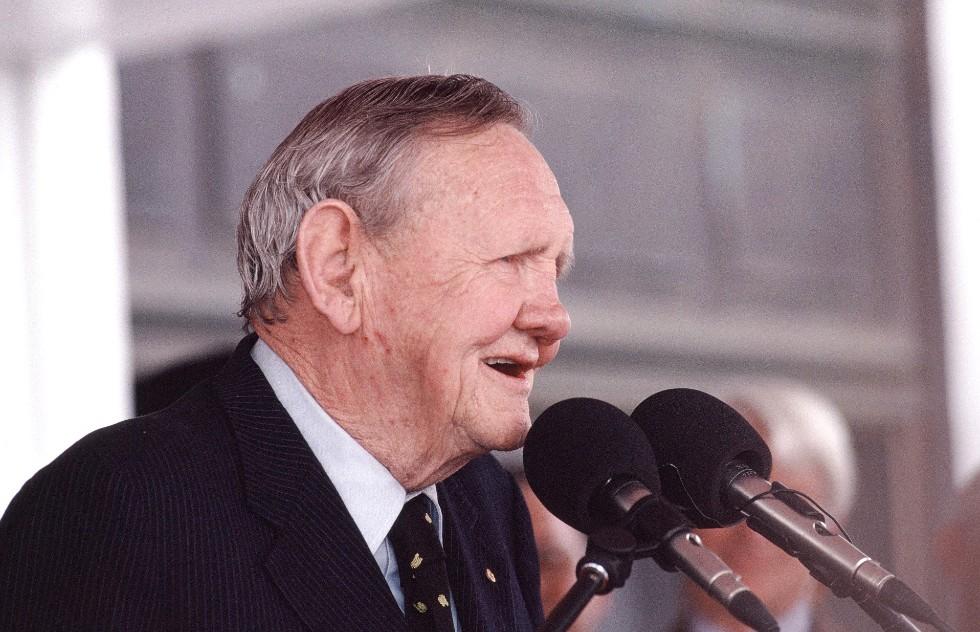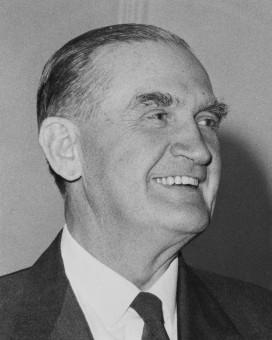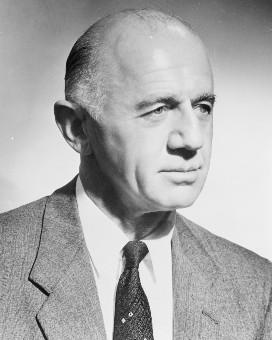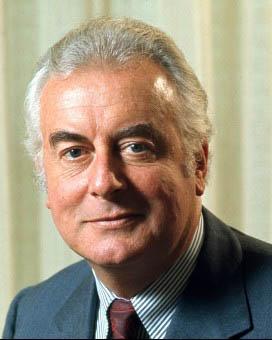
Sir John Gorton at the opening of Old Parliament House Museum, 1993. NAA: A6135, K27/4/93/50
After losing the prime ministership, John Grey Gorton remained in parliament until the double dissolution of 11 November 1975. He served as Minister of Defence in William McMahon’s government from March to August 1971. During this time, he attended the Commonwealth Five-Power Defence Talks in London in April 1971. Gorton’s uneasy personal relationship with the Prime Minister was magnified by differences between the 2 men over defence policy, most notably over Gorton’s lack of enthusiasm for basing Australian forces overseas and his criticism of Australia’s lack of defence preparedness. On 13 August 1971, McMahon sought and obtained Gorton’s resignation following the publication of the first of 6 articles defending his term as Prime Minister (under the title ‘I did it my way’). According to McMahon, Gorton had breached Cabinet solidarity by accusing ministers of leaking Cabinet secrets. Gorton denied any such breach. He resigned soon after as deputy leader of the Liberal Party.
Sitting on the back bench for the remaining period of the McMahon government, Gorton pursued, without much success, 2 of the issues which had concerned him as Prime Minister: the establishment of the film and television school and Commonwealth control of the sea bed. He returned to the Liberal front bench after the defeat of the McMahon government when Billy Snedden, the new leader, appointed him shadow Minister for the Environment. He also served on the Parliamentary Joint Committee on Prices (1973–74).
Gorton took up 2 highly controversial issues while in the Opposition. He supported abortion law reform to the extent of arguing a case against ‘compulsory pregnancy’, but opposed, along with the overwhelming majority, the reform Bill because of the absence of an agreed definition of when life began. The other issue was homosexual law reform. The House of Representatives passed a Gorton-sponsored motion supporting the principle of legalising homosexual acts between consenting adults in private. As a result, Senator Lionel Murphy, the Labor Attorney-General, agreed to change the Commonwealth law which only applied in the territories.
Gorton easily retained his seat of Higgins in the May 1974 double dissolution election. When told that McMahon would be leaving the front bench, Gorton acceded to Billy Snedden’s request that he should do so as well. Gorton sprang to Snedden’s defence on 27 November when a group of Liberal backbenchers sought to have Malcolm Fraser replace Snedden as leader. On 3 March 1975, Gorton announced that he would not be re-contesting Higgins at the next federal election and, on 21 March, left the party room when Fraser deposed Snedden.
Gorton announced his resignation from the Liberal Party on 24 May 1975, adding that he intended to seek election as an Independent for one of the 2 new Australian Capital Territory (ACT) seats. Angered by the Coalition’s decision to use the Senate to deny Supply to the Whitlam government, and by Governor-General Sir John Kerr’s decision on 11 November to appoint Malcolm Fraser as caretaker Prime Minister, Gorton urged Australians to vote for Labor in the House of Representatives in the subsequent dissolution election of 13 December. Gorton did stand as an Independent for the Senate in the ACT and gained 11% of the vote, but failed to win a seat. On the day after the election, he declared that he had ‘retired’.
Gorton continued, however, to maintain a public profile. He appeared frequently on television and ran a weekly radio program from 1978 to 1982. He took up other controversial causes, notably the legalisation of marijuana and the provision of heroin to addicts. And he never missed an opportunity to attack Malcolm Fraser, especially when the latter was Prime Minister (1975–83).
After Bettina Gorton died of cancer on 2 October 1983, Gorton lived almost as a recluse for years. Then, on 24 July 1993, he married Nancy Home and was again seen at public occasions. Among these was his speech at Old Parliament House in Canberra on 12 November 1997 in the ‘Prime Ministers on Prime Ministers’ lecture series. Perhaps even more historic was his readmission to the Liberal Party at the federal council’s gala dinner in Canberra in July 1999.
But without doubt, the grandest was his last public appearance – his 90th birthday dinner in Sydney on 7 September 2001. The chief organisers were his friends, the former Attorney-General in his government Tom Hughes, former Country Party leader Doug Anthony, and Labor veteran Clyde Cameron. The guests included politicians from all parties and others representing a wide cross-section of public life. There were even some who had known Gorton as a struggling orchardist nearly 60 years before. Margaret Whitlam delivered a message from Gough Whitlam and messages and videotaped greetings were received from the Queen, the Governor-General, former prime ministers Bob Hawke and Paul Keating, and former world leaders including Lord Carrington, Lord Healey, Sir Edward Heath and Dr Henry Kissinger.
It was a fitting valedictory for an individualist Prime Minister. On 19 May 2002, Gorton died in St Vincent’s Hospital, Sydney.
Sources
- Hancock, Ian, John Gorton: He Did It His Way, Hodder, Sydney, 2002.
- Henderson, Gerard, ‘Sir John Grey Gorton’, in Michelle Grattan (ed.), Australian Prime Ministers, New Holland, Sydney, 2000.





